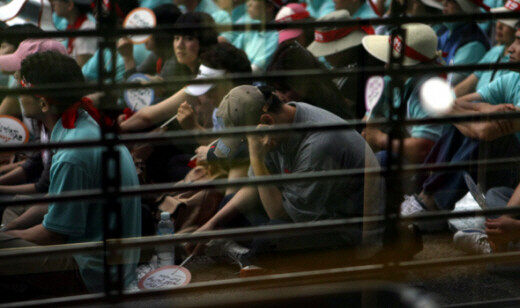hankyoreh
Links to other country sites 다른 나라 사이트 링크
Increase in irregular works presents barrier to economic growth, research shows

There are many research findings that show, to the contrary of the government and business push for labor market flexibility in the name of rescuing the economy, that labor market flexibility -- including an increase in the number of irregular workers -- would be a barrier to economic growth.
Hwang Seon-ung, a postgraduate researcher at the Korean Contingent Workers Center, investigated the effect an increase in the employment of irregular workers would have on economic growth, using factors like recent labor income distribution, export and import functions and investment. Hwang said if 10 percent of today’s irregular workers were to become regular workers, it would boost Korea’s real GDP by 1.56 percent to 2.79 percent. This means that labor market flexibility could become a poison rather than medicine for economic growth.
In fact, there are many experts who are raising doubts from a social and economic perspective about the benefits labor market flexibility would bring. Song Tae-jeong, a researcher with the Woori Financial Group, said that even if seen from the long-term perspective, the most urgent thing to do to break through the current crisis was to expand purchasing power, but increasing labor flexibility was going in the diametrically opposite direction. He said the losses in corporate showings could be larger than the immediate drop in corporate costs.
There are also voices that say if seen from a wider perspective, employment flexibility is a “frog in the well”-style stop-gap measure far removed from the reordering of the world economy following the recent financial crisis. Im Il-seop, a researcher at Nonghyup Economic Research Institute, said that with this recent economic crisis, consumption in the United States, which had been pulling the world economy, was naturally losing its power. Seen from the perspective that Korea needs to reorganize its economic structure, which is highly dependent on exports, in a direction of fundamentally strengthening internal demand, labor market flexibility was the wrong way to go.
Even if it does boost short-term growth potential, labor market flexibility could produce ill side-effects, too. A researcher at one national economic research center said today’s economic structure has moved to where things are determined by improving the quality of human capital rather than quantitative use of labor power. He said if the number of irregular workers increases, it would weaken Korea’s economic growth potential by dropping opportunities for education and lessening skills.
Please direct questions or comments to [englishhani@hani.co.kr]
Editorial・opinion
![[Column] Has Korea, too, crossed the Rubicon on China? [Column] Has Korea, too, crossed the Rubicon on China?](https://flexible.img.hani.co.kr/flexible/normal/500/300/imgdb/original/2024/0419/9317135153409185.jpg) [Column] Has Korea, too, crossed the Rubicon on China?
[Column] Has Korea, too, crossed the Rubicon on China?![[Correspondent’s column] In Japan’s alliance with US, echoes of its past alliances with UK [Correspondent’s column] In Japan’s alliance with US, echoes of its past alliances with UK](https://flexible.img.hani.co.kr/flexible/normal/500/300/imgdb/original/2024/0419/2317135166563519.jpg) [Correspondent’s column] In Japan’s alliance with US, echoes of its past alliances with UK
[Correspondent’s column] In Japan’s alliance with US, echoes of its past alliances with UK- [Editorial] Does Yoon think the Korean public is wrong?
- [Editorial] As it bolsters its alliance with US, Japan must be accountable for past
- [Guest essay] Amending the Constitution is Yoon’s key to leaving office in public’s good graces
- [Editorial] 10 years on, lessons of Sewol tragedy must never be forgotten
- [Column] A death blow to Korea’s prosecutor politics
- [Correspondent’s column] The US and the end of Japanese pacifism
- [Guest essay] How Korea turned its trainee doctors into monsters
- [Guest essay] As someone who helped forge Seoul-Moscow ties, their status today troubles me
Most viewed articles
- 1[Column] The clock is ticking for Korea’s first lady
- 2After 2 months of delayed, denied medical care, Koreans worry worst may be yet to come
- 3Samsung barricades office as unionized workers strike for better conditions
- 4[Column] Has Korea, too, crossed the Rubicon on China?
- 5[Correspondent’s column] In Japan’s alliance with US, echoes of its past alliances with UK
- 6Hong Se-hwa, voice for tolerance whose memoir of exile touched a chord, dies at 76
- 7All eyes on Xiaomi after it pulls off EV that Apple couldn’t
- 8US overtakes China as Korea’s top export market, prompting trade sanction jitters
- 9[Editorial] When the choice is kids or career, Korea will never overcome birth rate woes
- 10[Photo] Smile ambassador, you’re on camera